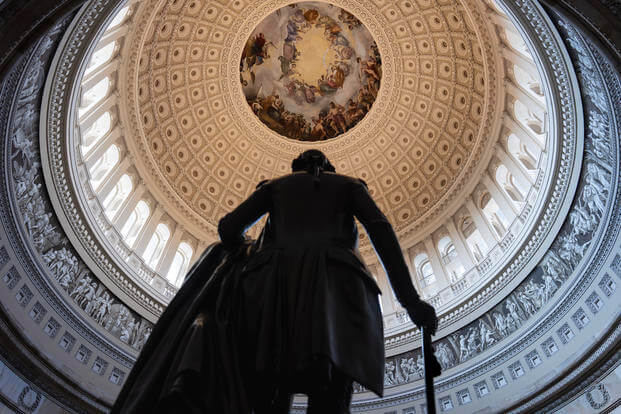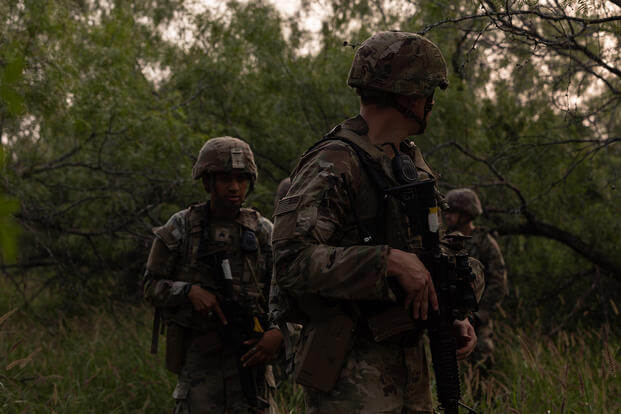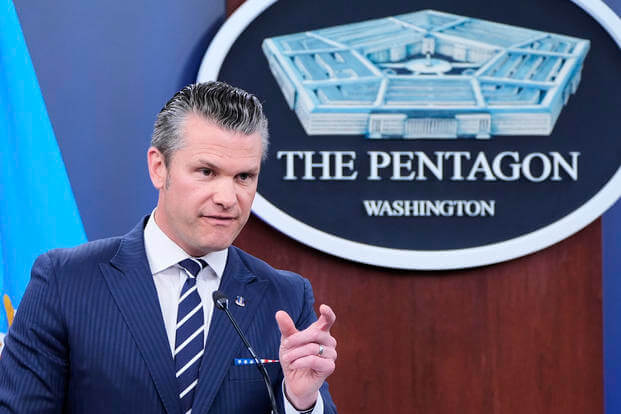Sweeping Trump Agenda Bill with $157 Billion Defense Boost, Food Aid Cuts Approved by Congress

A $157 billion defense funding boost that the Pentagon has been counting on to compensate for an otherwise flat budget has been approved by Congress and is on its way to President Donald Trump's desk for his signature.
The House voted 218-214 almost entirely along party lines on Thursday afternoon to pass the so-called One Big Beautiful Bill Act, sweeping legislation to enact Trump's agenda on everything from immigration to taxes. The House passage, which followed the Senate's narrow approval on Tuesday, closed a week of Congress sprinting to get the bill to Trump's desk by his self-imposed deadline of July 4.
In addition to bulking up defense funding, which includes a few billion dollars for service member quality-of-life improvements, the bill will slash social safety net programs, including food assistance that military families and veterans rely on.
Read Next: Guardsmen Help Operate 'Alligator Alcatraz' as Trump Increasingly Leans on Military for Immigration Crackdown[1]
"The One Big, Beautiful Bill makes a historic and long overdue investment of $150 billion to achieve President Trump's Peace Through Strength agenda and restore American deterrence," House Armed Services Committee Chairman Mike Rogers, R-Ala., said in a statement after the bill's passage. "We can't afford to wait any longer to begin rebuilding our military capacity, launching the future of American defense, and supercharging American manufacturing."
The Pentagon has been banking on passage of the bill to bring its budget next year to a record nearly $1 trillion. Without passage of the bill, the department has been planning a roughly $848 billion budget for fiscal 2026, essentially the same amount of funding it has this year.
The Pentagon's budget gimmickry irked some GOP defense hawks in Congress who had intended for the $150 billion in the One Big Beautiful Bill to supplement a regular $1 trillion defense budget. But the House, at least, has so far followed the Pentagon plan in its regular appropriations process[2].
The Pentagon has said the funding in the Trump agenda bill could be used to make up for holes[3] caused by pulling some existing funding for operations on the U.S.-Mexico border.
The bill approved Thursday includes about $1 billion for military operations on the border, compared to about $5 billion in border funding being planned for at the Pentagon.
The Army[4] has already moved about $1 billion[5] from facilities maintenance, including for dilapidated barracks, to border operations.
The One Big Beautiful Bill has $1 billion for barracks restoration -- but that money is intended to be divvied up between the Army, Air Force[6], Navy[7] and Space Force[8].
The bill separately provides about $350 million specifically for the Marine Corps[9]' housing improvement initiative known as Barracks 2030.
The bill also provides temporary authorization for more widespread barracks privatization, an idea that has gained steam in recent years[10] as the services have struggled with maintenance backlogs.
The bill's biggest pots of defense funding are $29 billion for shipbuilding, $25 billion for munitions and $25 billion for the Golden Dome, Trump's still hazy proposal[11] for a space-based missile shield over the United States.
The barracks funding in the bill is part of an overall $9 billion set aside for military quality-of-life issues, including $2 billion for military health care programs, $2.9 billion to help cover Basic Allowance for Housing[12] costs, $50 million for special pay[13] and bonuses, $100 million for child care fee assistance, and $10 million for military spouse[14] professional licensure fee assistance.
Meanwhile, the bill makes deep cuts to the Supplemental Nutrition Assistance Program, or SNAP, commonly referred to as food stamps.
Specifically, the bill will cut federal funding and force states to make up the difference. While the burden on states is not quite as heavy in the final bill[15] as originally proposed, state government officials and anti-hunger advocates have still warned that the burden-sharing will overwhelm state budgets and force them to make cuts that will affect everyone on the program, including veterans and military families.
SNAP is a lifeline for many military families, which face food insecurity at higher rates than the civilian population. About 1.2 million veterans are also estimated to be on SNAP.
The bill also revives SNAP's work requirements for veterans, reversing a change made in a bipartisan deal in 2023 that exempted all veterans from work requirements regardless of their disability status. The reversal has elicited fierce pushback from some veterans groups.
"Cutting SNAP exemptions for veterans is an unacceptable betrayal," Iraq and Afghanistan Veterans of America said in a statement last week. The bill's cuts "ignore the unique challenges veterans face, from service-connected disabilities to navigating the transition to civilian life. SNAP isn't a handout; it's a vital lifeline that keeps food on the table for those who serve."
Republicans have defended reviving work requirements for veterans by pointing to continued exemptions for people with disabilities and framing the mandate as an "opportunity."
"The One Big Beautiful Bill restores work, volunteer and training opportunities for veterans on SNAP -- rolling back a Biden-era carveout that denied them the dignity of work," House Agriculture Committee Republicans posted on social media Friday. "Veterans who qualify for exemptions remain fully protected."
Republicans pushed the bill through Congress using a process known as reconciliation, which allowed the bill to pass without any Democratic support. But wrangling enough GOP support to pass was also a battle.
In the Senate, Republicans added several provisions meant to spare Alaska from harsh benefits cuts in order to win support[16] from Sen. Lisa Murkowski, R-Alaska. Still, Vice President JD Vance needed to break a tie in order for the bill to pass the upper chamber because three other Republicans -- Sens. Susan Collins of Maine, Thom Tillis of North Carolina and Rand Paul of Kentucky -- opposed it.
In the House, members of the hard-line conservative Freedom Caucus spent Wednesday threatening to tank the bill over what they viewed as insufficient spending cuts, while some more moderate Republicans balked at Medicaid cuts. But ultimately, they voted for the bill Thursday without any changes.
Just two House Republicans, conservative Rep. Thomas Massie of Kentucky and moderate Rep. Brian Fitzpatrick of Pennsylvania, voted against the bill.
Related: Food Assistance Cuts Softened, Veterans Education Benefits Protected in Senate Version of Trump Agenda Bill[17]
© Copyright 2025 Military.com. All rights reserved. This article may not be republished, rebroadcast, rewritten or otherwise distributed without written permission. To reprint or license this article or any content from Military.com, please submit your request here[18].


